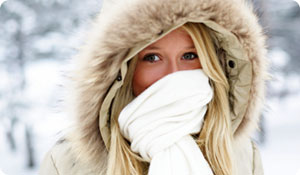
Winter's chilly temperatures and bitter winds can create a hostile environment for your hair. Things only get worse when you go inside, where dry heat saps hair of its natural moisture. But you don't have to have bad hair days all season. Try these everyday tips to minimize the frizz, breakage, and dryness.
- Prime your hair for winter with a good cut. Hair riddled with damage will be hard to protect against harsh weather.
- Step up your conditioner. You may need to switch to a richer and/or leave-in formula to boost your hair's ability to retain moisture. If you choose not to switch products, you can also add extra conditioner to the middle and ends, which are most affected by dryness.
- Protect your hair when you go outside, but make sure your hat isn't so tight that it makes your scalp sweat and become greasy. Instead, wrap a scarf loosely around your head.
- Never leave the house with wet hair. Freezing temperatures can cause wet hair to break off, accelerating split ends.
- Give your hair a rest from the potentially damaging, drying heat from hairdryers and curling/flat irons whenever possible. When you do use these, try to wait until your hair is 75 percent dry before applying heat.
- Wash your hair in lukewarm (not hot) water. After conditioning, try a cold-water rinse to help seal in the moisture. If your hair doesn't become too greasy, wait an extra day between washes to offset the atmosphere of extra-dry air.
- For hair charged with static electricity, try rubbing a dryer sheet over it before you brush it or you'll create more frizz.
Stylist Jocelyn Dunnavant from Brooklyn's Slope Suds salon recommends a simple way to rejuvenate winter hair: Rub almond, olive, or even bath oil into your hair, making sure to saturate the ends. Wrap your hair in a towel and allow the oil to penetrate for anywhere from 15 minutes to overnight, depending on how severe your dryness. Be sure to shampoo and condition normally afterwards—you should see a difference immediately.
Dunnavant adds that pollution is a particular problem during winter, especially for people with color-treated hair that can actually change hue. If you find yourself experiencing a problem like this due to residue or even just extreme dryness, you should talk to your stylist about professional treatments that will restore life to your winter hair.





